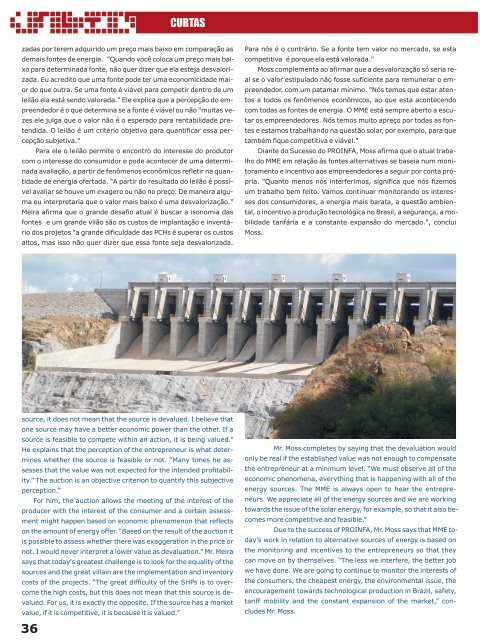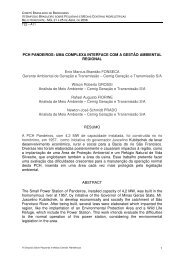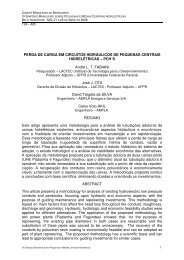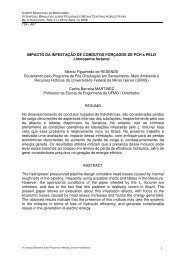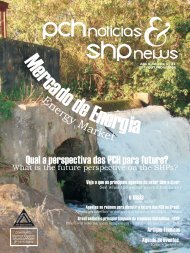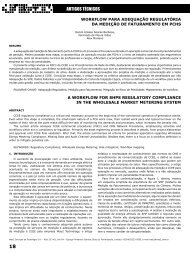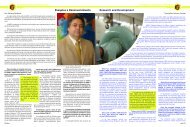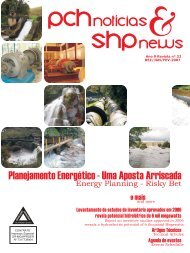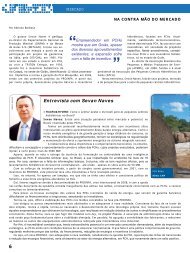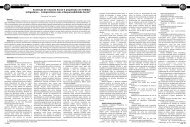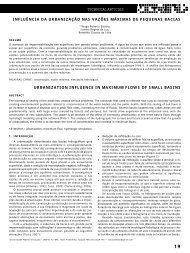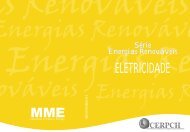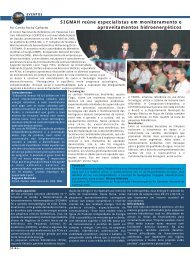03 - CERPCH - Unifei
03 - CERPCH - Unifei
03 - CERPCH - Unifei
Create successful ePaper yourself
Turn your PDF publications into a flip-book with our unique Google optimized e-Paper software.
CURTAS<br />
zadas por terem adquirido um preço mais baixo em comparação as<br />
demais fontes de energia. "Quando você coloca um preço mais baixo<br />
para determinada fonte, não quer dizer que ela esteja desvalorizada.<br />
Eu acredito que uma fonte pode ter uma economicidade maior<br />
do que outra. Se uma fonte é viável para competir dentro de um<br />
leilão ela está sendo valorada." Ele explica que a percepção do empreendedor<br />
é o que determina se a fonte é viável ou não "muitas vezes<br />
ele julga que o valor não é o esperado para rentabilidade pretendida.<br />
O leilão é um critério objetivo para quantificar essa percepção<br />
subjetiva."<br />
Para ele o leilão permite o encontro do interesse do produtor<br />
com o interesse do consumidor e pode acontecer de uma determinada<br />
avaliação, a partir de fenômenos econômicos refletir na quantidade<br />
de energia ofertada. "A partir do resultado do leilão é possível<br />
avaliar se houve um exagero ou não no preço. De maneira alguma<br />
eu interpretaria que o valor mais baixo é uma desvalorização."<br />
Meira afirma que o grande desafio atual é buscar a isonomia das<br />
fontes e um grande vilão são os custos de implantação e inventário<br />
dos projetos "a grande dificuldade das PCHs é superar os custos<br />
altos, mas isso não quer dizer que essa fonte seja desvalorizada.<br />
source, it does not mean that the source is devalued. I believe that<br />
one source may have a better economic power than the other. If a<br />
source is feasible to compete within an action, it is being valued.”<br />
He explains that the perception of the entrepreneur is what determines<br />
whether the source is feasible or not. “Many times he assesses<br />
that the value was not expected for the intended profitability.”<br />
The auction is an objective criterion to quantify this subjective<br />
perception.”<br />
For him, the auction allows the meeting of the interest of the<br />
producer with the interest of the consumer and a certain assessment<br />
might happen based on economic phenomenon that reflects<br />
on the amount of energy offer. “Based on the result of the auction it<br />
is possible to assess whether there was exaggeration in the price or<br />
not. I would never interpret a lower value as devaluation.” Mr. Meira<br />
says that today's greatest challenge is to look for the equality of the<br />
sources and the great villain are the implementation and inventory<br />
costs of the projects. “The great difficulty of the SHPs is to overcome<br />
the high costs, but this does not mean that this source is devalued.<br />
For us, it is exactly the opposite. If the source has a market<br />
value, if it is competitive, it is because it is valued.”<br />
36<br />
Para nós é o contrário. Se a fonte tem valor no mercado, se esta<br />
competitiva é porque ela está valorada."<br />
Moss complementa ao afirmar que a desvalorização só seria real<br />
se o valor estipulado não fosse suficiente para remunerar o empreendedor,<br />
com um patamar mínimo. "Nós temos que estar atentos<br />
a todos os fenômenos econômicos, ao que esta acontecendo<br />
com todas as fontes de energia. O MME está sempre aberto a escutar<br />
os empreendedores. Nós temos muito apreço por todas as fontes<br />
e estamos trabalhando na questão solar, por exemplo, para que<br />
também fique competitiva e viável."<br />
Diante do Sucesso do PROINFA, Moss afirma que o atual trabalho<br />
do MME em relação às fontes alternativas se baseia num monitoramento<br />
e incentivo aos empreendedores a seguir por conta própria.<br />
"Quanto menos nós interferimos, significa que nós fizemos<br />
um trabalho bem feito. Vamos continuar monitorando os interesses<br />
dos consumidores, a energia mais barata, a questão ambiental,<br />
o incentivo a produção tecnológica no Brasil, a segurança, a mobilidade<br />
tarifária e a constante expansão do mercado.", conclui<br />
Moss.<br />
Mr. Moss completes by saying that the devaluation would<br />
only be real if the established value was not enough to compensate<br />
the entrepreneur at a minimum level. “We must observe all of the<br />
economic phenomena, everything that is happening with all of the<br />
energy sources. The MME is always open to hear the entrepreneurs.<br />
We appreciate all of the energy sources and we are working<br />
towards the issue of the solar energy, for example, so that it also becomes<br />
more competitive and feasible.”<br />
Due to the success of PROINFA, Mr. Moss says that MME today's<br />
work in relation to alternative sources of energy is based on<br />
the monitoring and incentives to the entrepreneurs so that they<br />
can move on by themselves. “The less we interfere, the better job<br />
we have done. We are going to continue to monitor the interests of<br />
the consumers, the cheapest energy, the environmental issue, the<br />
encouragement towards technological production in Brazil, safety,<br />
tariff mobility and the constant expansion of the market,” concludes<br />
Mr. Moss.


